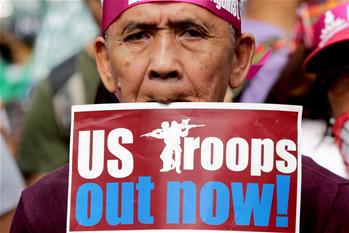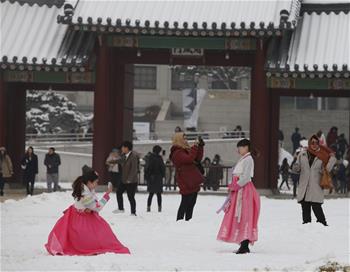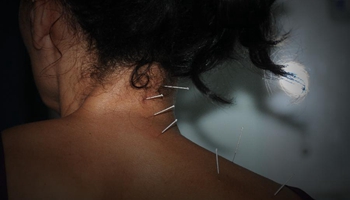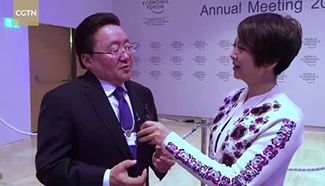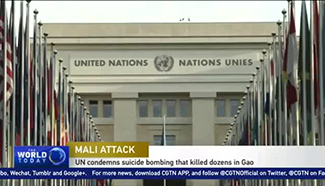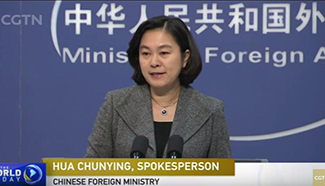ADEN, Yemen, Jan. 20 (Xinhua) -- Yemen's people are still besieged by violence and crisis two years after the military intervention of the Saudi-led coalition to support Yemen's government against the Shiite Houthi rebels who occupied the country's capital in September, 2014.
"Two years of suffering have passed and Yemenis are still killing each other in different battlefields across the country," said Rashid Hassan, a resident in the southwestern province of Taiz, which is besieged by pro-Houthi forces.
"It's obvious that a third year of displacement and killing is waiting for us. No hopes of political solutions or peace," he added.
The Shiite Houthi group, which is accused of receiving military assistance from Iran, took over Sanaa along with other northern provinces and placed Yemen's internationally recognized President Abdu-Rabbu Mansour Hadi and other high-ranking officials under house arrest on Jan. 22, 2015, but he escaped to Aden a month later.
Backed by elite troops from the Republican Guard Forces loyal to former President Ali Abdullah Saleh, the Shiite Houthi rebels established their presence in Sanaa and seized control of all the state institutions and ministries.
In March 2015, the Houthi militias expanded their control, launched large military campaigns against rival forces in the southern provinces and reached Aden.
The pro-Houthi forces invaded Aden with heavy armored vehicles and captured Yemen's Defense Minister Major General Mahmoud Subaihi, who is still in Houthi's jail in Sanaa, but they failed to catch President Hadi.
In the night of March 26, 2015, Saudi Arabia, in association with other Arab and Gulf countries, led the Decisive Storm operation to promote the stability of Yemen.
Houthis' presence in the country's southern part didn't last long. They were expelled from Aden by a Saudi-backed military offensive that also had liberated five neighboring southern provinces from Houthi's control.
Thousands of people celebrated the victory against Houthis in Aden and southern Yemen but soon realized that they were still in violence and lack of basic services, with many injured residents sitting at homes without treatment.
"The southern people foiled the Houthi's occupation and liberated their provinces, but now they are occupied by the Saudi-backed government," is a popular phrase shared by the Yemenis on social media, demonstrating their anger toward the situation in the country, particularly in the southern regions controlled by Hadi's government.
For residents in several neighborhoods of the southern port city of Aden, where Yemen's internationally recognized government has temporarily based itself, almost everyone complained about the worsening security situation and the lack of basic services such as water and electricity.
"Masked gunmen can easily assassinate military officials almost every week and peace has become a rarity in Aden," 27-year-old pharmacist Fadwa Mohamed said.
"The security situation in addition to the repeated blackouts of electricity badly affected us. We can't perform our works perfectly," she added.
Ali Bin Khaled, a student at Aden University, said that Aden did get liberation after the fleeing of Houthi gunmen, "but a lot of problems still exist and the presence of Yemen's government in Aden played a negative role."
"Many crises in Aden are caused by corrupt officials loyal to President Hadi. Aden's streets are filled with trash and sewage pools everywhere," he said.
In 2016, the Saudi-led Arab coalition dispatched hundreds of armored vehicles and established well-equipped military units in Aden and other southern provinces to support the Yemeni government.
However, disputes between leaders of the pro-government army units appeared almost every month, leading to intra-faction clashes in Aden Province, the country's temporary capital.
Last week, armed clashes broke out between two military factions, forcing Aden University to shut down the faculty of languages and three other colleges citing concerns about the safety of students.
"The priorities for the military units are saving the citizens and securing the educational institutions, but unfortunately they clash with each other causing panic in the city," said a lecturer at the Faculty of Arts in Aden.
"Commanders of the army units cannot put aside their differences and cannot focus on rebuilding securing Aden and fighting the terrorist groups," said the 23-year-old Aden resident. "The unfair distribution of money between the army units usually lead to differences and armed clashes."
Persistent fuel shortage has disrupted business and badly affected the living conditions of citizens in the government-controlled southern provinces including Aden.
"The fuel shortage is affecting us too much. In these days, the transportation fees are too high comparing to last year," said Sarah Waleed, an Aden-based female youth activist.
"It's very difficult to get fuel from the petrol stations due to the very long queues of cars waiting there for several days," she lamented.
"The government kept watching the citizens suffering and worked nothing to solve the crisis in Aden," the woman added.
Fear and anxiety spread among traders in Aden, leading to hiking prices of essential goods including food.
"Thousands of employees haven't received their salaries for four months. How can we counter the hiking prices?" 26-year-old teacher Akram Hashem said.
Many armed groups that received military support in 2015 and participated in the anti-Houthi fighting in Aden and elsewhere are refusing to hand over heavy and medium weapons to the government.
"Hadi's government is facing a real security challenge as anti-Houthi armed groups insist on possessing heavy weapons in southern Yemen," a military official told Xinhua on condition of anonymity.
"The government is now trying to convince these groups to hand over their weapons and join the armed forces," the military source said.
Many residents in the southern Yemeni provinces dream of seeing police stations replace militias that failed to confront the terrorist elements of the Yemen-based al-Qaida branch.
Aden witnessed several well-planned assassinations and armed attacks after Saudi-backed forces drove the Shiite Houthi rebels from the strategic city of Aden in July 2015.
Yemen has been suffering from a civil war and a Saudi-led military intervention for about two years. The civil war began after the Houthi militants with support from forces loyal to the former president ousted the UN-backed transitional government.
The legitimate government now controls the south and some eastern parts, while the Houthi/Saleh alliance controls the other parts including the capital Sanaa.
The UN has brokered rounds of peace talks between the warring factions, but they failed to reach any common ground.

